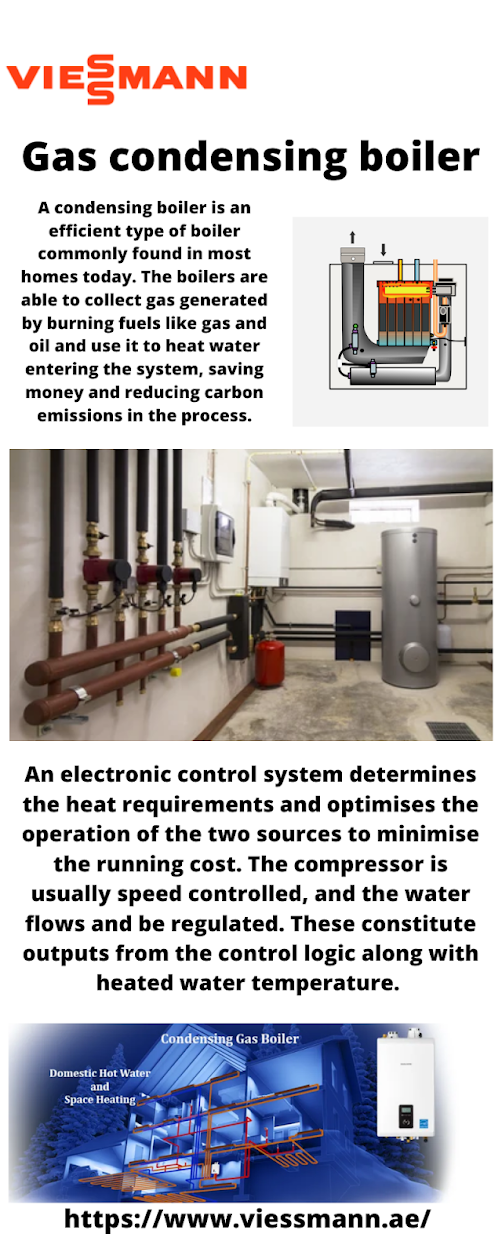Best Gas Condensing Boiler In UAE
Viessmann Condensing boiler is any boiler which uses condensing technology to make better use of the heat they generate from burning fuels like gas or oil - so a combo boiler can also be a condensing boiler. Today, the overwhelming majority of boilers in UK households are gas condensing combo boilers.
A condensing boiler is an efficient type of boiler commonly found in most homes today the boilers are able to collect gas generated by burning fuels like gas and oil and use it to heat water entering the system, saving money and reducing carbon emissions in the process.
In a conventional boiler, fuel is burned and the hot gases produced pass through a heat exchanger where much of their heat is transferred to water, thus raising the water's temperature.
The condensate produced is slightly acidic so suitable materials must be used in areas where liquid is present. Aluminum alloys and stainless steel are most commonly used at high temperatures. In low temperature areas, plastics are most cost effective the production of condensate also requires the installation of a heat exchanger condensate drainage system. In a typical installation, this is the only difference between a condensing and non-condensing boiler.
To economically manufacture a condensing boiler's heat exchanger and for the appliance to be manageable at installation the smallest practical size for its output is preferred. This approach has resulted in heat exchangers with high combustion side resistance, often requiring the use of a combustion fan to move the products through narrow passageways. This has also had the benefit of providing the energy for the flue system as the expelled combustion gases are usually below 100 °C and as such, have a density close to air, with little buoyancy. The combustion fan helps to pump exhaust gas to the outside.
How does a condensing boiler work?
A condensing boiler uses condensing technology to make better use of the heat it generates. When a power matching as gas or painting is burned, manna’s are released via a spout. In an on-condensing boiler system these manna’s would be released into the atmosphere and their heating potentiality would be lost.
Notwithstanding in a condensing boiler the hot delights are captured and reclaimed back into the system through a heat exchanger into what’s known as the primary circuit Depending on the boiler type, the primary circuit either moves the heat to either the heating circuit (radiators) or the domestic hot water. In a combination boiler the hot water is most ordinarily hatted through a secondary heat exchanger known as a plate to plate. On a heat only appliance the domestic hot water is hatted and stored in a cylinder within the property.
The main reason why condensing boilers are better than non-condensing models is that they are by reaching up to 99% efficiency, condensing boilers can help you lower your fuel bills significantly and reduce your carbon footprint, making them a great alternative heating system.
All modern domestic boilers including combo boilers, system and regular boilers now use condensing technology. All domestic boilers produce hot waste exhaust gases, which exit the boiler via the flue, however, all new boilers are fitted with a Flue Gas Heat Recovery System, making them condensing.
It's important to understand the difference between these two words which can be freely confused. To help understand the difference, let’s take a higher look at what they mean.
How long do condensing boilers last?
The lifespan of a condensing boiler will vary on its build quality, model and usage. However, you can prolong the lifespan of a condensing boiler through correct servicing. Servicing of your boiler should be done once a year by a Gas Safe registered heating engineer. See more on Always check the warranty of your boiler to ensure you are choosing a quality option. Valliant boilers, such as our Eco TEC and Eco FIT models, come with a as standard but can be extended up to 10 years through a Valliant Advance installer.
How much do they cost?
Different sizes and boiler types suit different needs and property types, so it's best that you get advice from a local expert to find out what’s most suitable. Please bear in mind that the most expensive models with big outputs might not be the right solution for heating and hot water for your home as they could be oversized and as a result will not work properly, resulting in unnecessary spend.

Comments
Post a Comment